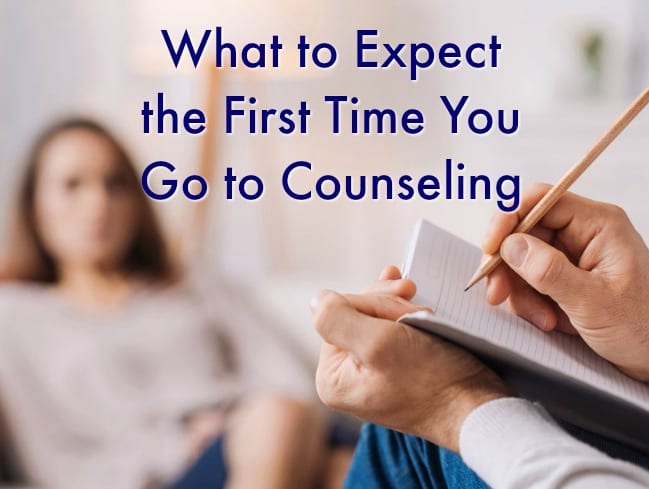Going to a counselor for the first time can be scary for some people. Many people who have never participated in therapy wonder what it will be like. You may wonder if the therapist will ask you a lot of questions about your feelings, want to discuss your fears, or maybe talk about your upbringing. The truth is that every therapist will handle counseling sessions differently. Whatever your reason for seeking professional help, you won’t feel so nervous if you know what to expect.
Why people don’t go:
There are often several myths surrounding counseling. Many times, people have a preconceived notion of what they think therapy will be like because of how it is portrayed in movies and TV shows a – a detached listener who is charging too much money while you do all the talking. In reality, while there’s often a comfy couch or chair, therapists are active listeners who should be engaging in the conversation with you.
One of the biggest hang-ups the is the cost of therapy. Therapy can be expensive, but it’s an investment and you should be getting a return on your investment. When you go to the doctor, you expect to pay but you also expect to get something out of the visit. Therapy is much like a doctor visit. Therapists are trained, licensed health care professionals who want to help find solutions that will help you. Also, many therapists take insurance, have sliding fees, or financial hardship agreements. Some even offer payment plans.
Another common myth is that therapists are just people you’re paying to listen to your problems. While compassionate listening is an important part of the counseling process, therapists have had extensive schooling and licenses and have spent years studying people, relationships, communication, and conflict resolution.
Finding a therapist:
The first step to starting therapy is to find a therapist who fits your needs. Different therapists are going to use different counseling styles and strategies. Some will even specialize in certain topics such as addiction or marriage counseling. There are several ways to find a therapist. You can look online, or, if cost is a factor, you could ask your insurance company for a list of therapists who would be considered in-network. Referrals from friends and family are another great way to find a therapist. Try looking for a therapist who specializes in what you are seeking therapy for.
The initial phone call:
Each counseling office will be different on how they handle the first call. Here at Spence Counseling Center, you can call our new client line or talk to an administrative assistant. Then a lead therapist will call you back and will do a quick consult on the phone with you to assess what your goals for therapy are and how you would like to pay, and from there we can match you with the therapist who is right for your situation. The therapist you will be working with will call and set up the initial session. Take advantage of this call and ask any preliminary questions you may have. Oftentimes, during the initial call or after the first session, you can tell if the therapist-client relationship will work or not.
The first session:
The initial session is a time to get to know each other. Your therapist may ask you why you sought therapy and which direction you’d like to explore so the therapy sessions will be useful. The therapist may also let you know of expectations and therapy styles that may work to help you reach your goals. They will get an assessment of the current issue(s) and some background information. The important thing to remember is that the therapist-client relationship is exactly that — a relationship. Since you are part of the relationship, it helps if you are prepared to talk with your therapist openly about what your goals and expectations are.
Making the most of therapy:
A new therapy client doesn’t always know what is expected the first time they come to counseling so they are often not prepared for that first session. Below are a few more tips to help make the first therapy session and any future sessions go well and be beneficial to you.
- Know when to schedule. If you have never been in counseling, you won’t know the effect the therapy session will have on you. You may be fine to go back to work after your first session or you might need a few hours by yourself to debrief and unwind. Until you know, try to schedule your first session on a day off or at the end of the work or school day if possible.
- Get there early. Come to your first appointment early in case there is paperwork to fill out. There will usually be some paperwork such as a consent form and billing or insurance paperwork so it helps to come prepared.
- Expect to talk about your history. Your therapist will ask you about some of your history your first session such as important relationships, academic and work history, and how your current situation developed. You don’t need to give the full account of your life story but come ready with a few highlights.
- Expect the office to look like a living room. You may have been imagining yourself resting on a chaise lounge as your therapist asks, “And how does that make you feel?” More realistically, you’ll typically have a living room setup with whatever personal touches your therapist brings. The room might even give you clues as to whether you two will be a good fit. If the office looks very clinical and there’s not a lot in there, then you might expect a more formal relationship.
- Don’t just sit there. We can’t stress the importance of the client-therapist relationship which means this is a team effort. If you don’t take an active part in the sessions, you won’t find the counseling experience valuable or meaningful.
- Be open and honest.Counselors are trained to ask the right questions, but they are not mind readers. If you are open during your therapy sessions, you will have a more effective outcome.
- List your hot buttons. It doesn’t hurt to discuss actions or words that can be done or said by either that could harm the relationship. For instance, being perpetually late may be a pet peeve for either the client or therapist. Knowing information like this can help to preserve the relationship and also help the client and therapist better understand each other.
- Be prepared.Before you get to the initial session, know why you are seeking therapy in the first place. One way to prepare is to make a list and then read it out loud. Hearing yourself say it a few times will help you describe things more clearly to the therapist.
- Ask questions.The more you understand how the counseling experience works, the more comfortable you’ll be. It’s okay to ask questions about the therapy process and ask the therapist to repeat or rephrase anything you don’t understand.
- Be realistic. Be sure to go to your first session with realistic expectations. Therapy is a process and is often not solved in one or two sessions. It may take time to build a relationship with your therapist as well as find the right therapeutic resolution.
- Expect to feel uncomfortable. Change is hard and change makes us uncomfortable but it’s part of the process to get you to where you want to be. There may be times when your therapist challenges you to work past a specific issue. Of course, the work you do in therapy should never be unbearable or debilitating, so if things are getting to be too much, speak up.
- Embrace the small things. You don’t always have to have some huge issue to discuss each time. Sometimes the sessions when you think you have nothing to talk about lead to the biggest breakthroughs. Part of a therapist’s job is to make sure each session is productive and stays on track, so they may have things to ask you that may lead to the heart of the issue. This is especially true because we tend to avoid things that are hard to deal with and may not even consider bringing them up in therapy.
- You may have homework: Your therapist may assign a homework assignment outside of your therapy time. Take the time to do these extra steps. Your counselor is assigning homework that is relevant to your specific situation which will help you. Without this outside work, the therapeutic treatment that develops during a therapy session is at risk of being buried by patterns of negative thinking and behavior that have been strengthened through years of unintentional practice. An hour of therapeutic work is often not enough to create the change needed during the other 167 hours in a week.
- You can disagree. You can (and should) speak up if you don’t agree with your therapist. Counseling should feel like a safe space where you can say anything. And that includes if you don’t understand something or if you disagree with something your therapist says. This allows your therapist to tailor treatment to what will work best for you. For example, if you hate journaling and know you won’t do it—let them know that before you miss a homework assignment.
- Don’t ghost your therapist. It’s important to explore issues rather than just leave treatment. It’s worth talking about ending your relationship if you feel your therapist is no longer helping you, especially if you have been working together for some time. If you don’t address these issues, you may find the same thing in the next therapist.
- Evaluate the first session. Decide whether or not the therapist is someone you want to go back to. Ask yourself if you felt understood, were able to speak freely, or received valuable feedback.
- Be proud that you took that first step. Therapy is a journey that has incredible payoff. You took an act of bravery by taking the first step. It’s not always easy and it’s not always fun, but in the end, you’ll have more awareness and therefore more power in your life.
Ultimately, therapy should be bettering your life—even if it’s work.

